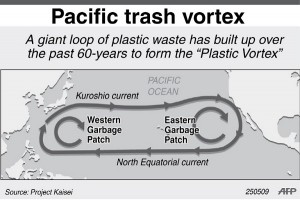Pacific plastic soup grew 100-fold
PARIS – The vast swirl of plastic waste floating in the North Pacific has grown 100-fold over the last 40 years, according to a research paper published Wednesday.
And scientists warned the killer soup of microplastic – particles smaller than five millimeters (0.2 of an inch) – threatened to alter the open ocean’s natural environment.
In the period 1972 to 1987, no microplastic was found in the majority of samples taken for testing, said the paper in the Royal Society journal Biology Letters.
Today, scientists estimate the swirling mass of waste known as the North Pacific Subtropical Gyre (NPSG) or the Great Pacific Garbage Patch, is roughly the size of Texas.
“The abundance of small human-produced plastic particles in the NPSG has increased by 100 times over the last four decades,” said a statement on the findings of researchers from the University of California.
Article continues after this advertisementThe United Nations Environment Program says around 13,000 pieces of plastic litter are found in every square kilometer of sea, but the problem is worst in the North Pacific.
Article continues after this advertisementThe plastic particles are being vacuumed up by marine life and birds, and the mix is heavy with toxic chemicals.
The study said the NPSG is providing a new habitat for ocean insects called “sea-skaters” which prey on plankton and fish eggs and are in turn fed on by seabirds, turtles and fish.
The insect, which spends its entire life at sea, needs a hard surface on which to lay its eggs — previously limited to relatively rare items like floating wood, pumice and sea shells.
If microplastic density continued to grow, insect numbers would increase as well, the scientists warned, “potentially at the expense of prey such as zooplankton or fish eggs”.
